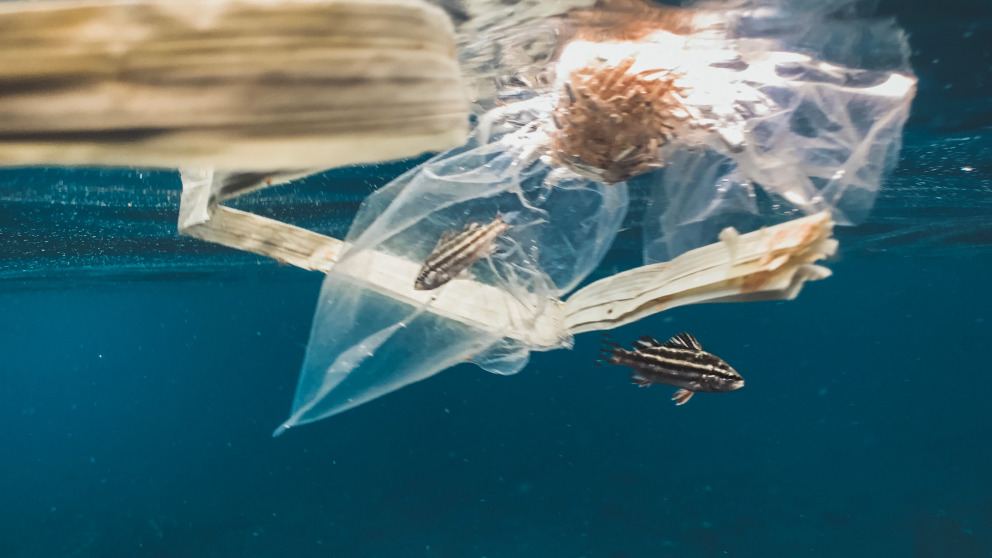Recommendations for Regional Action to Combat Marine Plastic Pollution
10.02.2021
Millions of tonnes of plastic waste find their way into the ocean every year. A team of researchers from the Institute for Advanced Sustainability Studies (IASS) in Potsdam has investigated the role of regional ocean governance in the fight against marine plastic pollution, highlighting why regional marine governance should be further strengthened as negotiations for a new global agreement continue.

In recent years, images of whales and sea turtles starving to death after ingesting plastic waste or becoming entangled in so-called ghost nets have led to a growing awareness of the crisis of marine plastic pollution. The total number of plastic bags, fishing equipment, disposable bottles and other plastic items currently in the ocean is unknown. However, studies show that plastic waste has become ubiquitous, from the Arctic to the Antarctic, from the surface to the bottom of the deep sea. It comes in all shapes and sizes – from vast fishing nets to tiny particles of microplastic.
Various agreements have been reached at the national, regional and global levels to tackle the issue. However, these measures have failed to effectively address the challenges around marine plastic pollution, write the authors of the new report published by the IASS – "Stronger together: The role of regional instruments in strengthening global governance of marine plastic pollution". More comprehensive measures and systemic changes are urgently needed to reduce and prevent marine plastic pollution. The issue is all the more urgent as the amount of plastic manufactured globally is expected to double in the next ten to fifteen years.
The challenges
According to the report, the key challenges for the further development of existing initiatives to combat plastic waste in marine regions such as the Baltic Sea, the Pacific or the Caribbean include:
- a great variation in the level of implementation of measures to address plastic pollution,
- large differences in the monitoring and assessment of relevant data,
- deficits in the implementation of multi-stakeholder approaches, and
- a widespread lack of engagement with the private sector.
Improving private sector engagement and data collection
According to the report, private sector engagement is crucial to reducing the flow of plastic waste into the sea. The authors recommend that regional working groups be established to foster cooperation. "Working groups would provide a forum for organizations that are committed to marine conservation to engage with private companies and discuss how the discharge of plastic waste into the sea can be prevented by, for example, using alternative materials in manufacturing or improving waste management systems," says IASS researcher and lead author Nicole Wienrich. Measures should be tailored towards establishing a circular economy with a waste hierarchy based on the principle of "Reduce, Reuse, Recycle". A global agreement could establish common goals and minimum standards.
The report also highlights the need to improve data collection around marine plastic pollution. Various organizations maintain records on the extent of plastic waste flows into the ocean. "The lack of common standards and methods for data collection makes it difficult to draw comparisons across data sets and reduces their utility," explains IASS researcher Laura Weiand, who contributed to the study. Regular and long-term monitoring would be necessary to detect differences in the nature and volume of plastic waste flows. Only then could organizations determine whether measures are successful and have the desired effect. A global agreement to address the issue of marine plastic pollution could establish a common framework for data collection and assessment.
Innovative methods should be used to collect data on marine plastic pollution. Citizen science projects involving local populations could also help to collect the necessary data. In addition, drones, unmanned aircraft and satellite images could all be used to simplify data collection and provide insights on waste volumes on remote areas such as the high seas.
Regional initiatives complement future global agreement
Regional organizations provide a vital opportunity to address the issue of marine plastic pollution at the ecosystem level. They can also facilitate the development and implementation of solutions that are tailored to address the challenges, needs and characteristic features of different regions and affected countries. They also create opportunities to exceed the standards set by a new global agreement with ambitious regional agreements which can inspire further action around the world.
As negotiations for a global agreement continue, the team of authors recommends that regional cooperation to prevent marine plastic pollution be strengthened further – not least because these negotiations could well continue for several years. "We can't wait that long and simply accept the status quo – this problem is too big and too urgent," says Sebastian Unger, Research Group Leader at the IASS.
Publication:
Wienrich, N., Weiand, L., Unger, S.: Stronger together: The role of regional instruments in strengthening global governance of marine plastic pollution, 02/2021.
DOI: 10.48440/iass.2021.008
Media
Launch of the report on regional instruments in combating marine plastic litter

